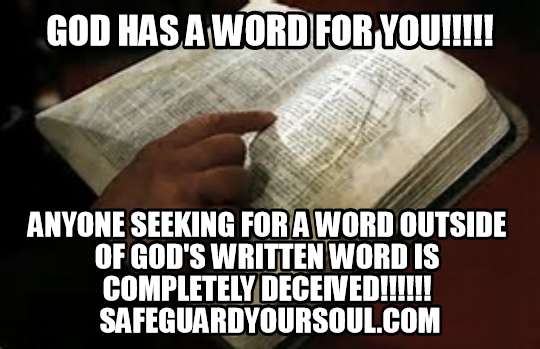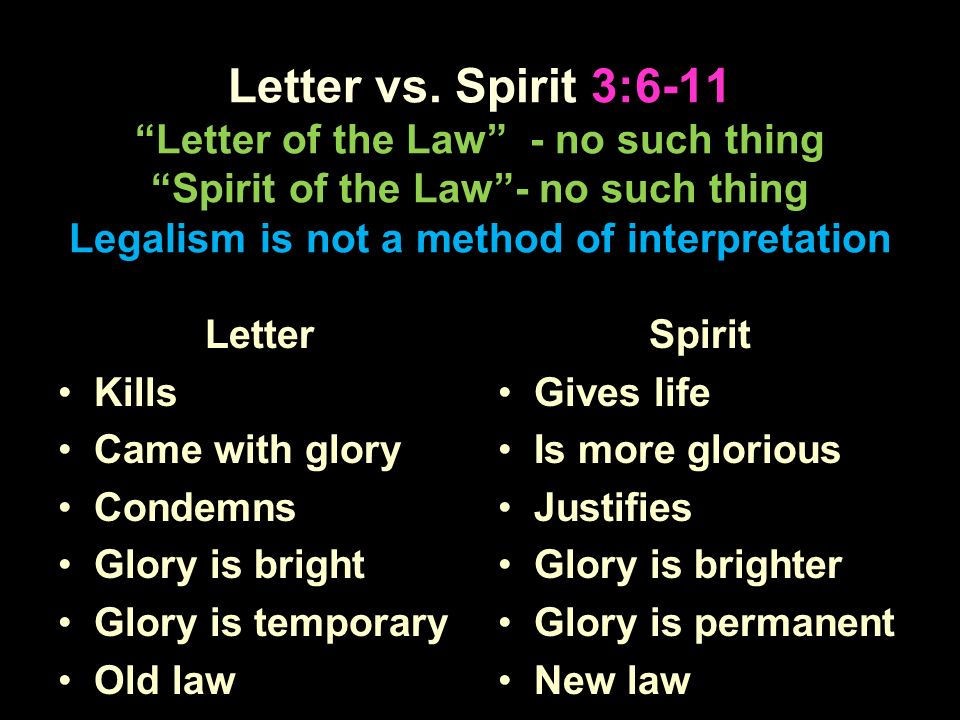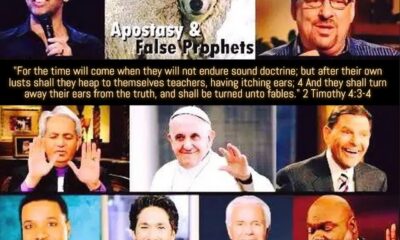
“The Letter Killeth, but the Spirit Giveth Life”
See if you’ve ever heard this verse mis-used to block the light of truth.
“… the letter killeth, but the spirit giveth life.” 2 Corinthians 3:6
Yes this verse says “the spirit giveth life” and yet this in no way negates the divine command to live out and to “preach the word… in season and out of season.” (2 Timothy 4:2-4) The point is that many are using this Scripture out of its context to say or insidiously insinuate that God’s people shouldn’t “preach the Word” as the LORD commanded us to do (2 Timothy 4:2). Ephesians 6:17 says “the sword of the Spirit is the word of God.” (Ephesians 6:17) Neither the Word nor the Spirit of God can be discounted or separated from each other.
The LORD commands His people to …
“Preach the word; be instant in season, out of season; reprove, rebuke, exhort with all longsuffering and doctrine. 3 For the time will come when they will not endure sound doctrine; but after their own lusts shall they heap to themselves teachers, having itching ears; 4 And they shall turn away their ears from the truth, and shall be turned unto fables.” 2 Timothy 4:2-4
There is power in the Word of God and when it is sent forth from the mouths of His anointed people, lost souls are convicted, they repent, and are saved!
“And he said unto them, Go ye into all the world, and preach the gospel to every creature.” Mark 16:15
THIS is why Satan aims at stopping the preaching of the Word of God – it is wrecking his evil kingdom of darkness.
“But have renounced the hidden things of dishonesty, not walking in craftiness, nor handling the word of God deceitfully; but by manifestation of the truth commending ourselves to every man’s conscience in the sight of God. 3 But if our gospel be hid, it is hid to them that are lost: 4 In whom the god of this world hath blinded the minds of them which believe not, lest the light of the glorious gospel of Christ, who is the image of God, should shine unto them. 5 For we preach not ourselves, but Christ Jesus the Lord; and ourselves your servants for Jesus’ sake. 6 For God, who commanded the light to shine out of darkness, hath shined in our hearts, to give the light of the knowledge of the glory of God in the face of Jesus Christ.” 2 Corinthians 4:2-5
Satan wishes to keep his prey, his captives in darkness, blinded. His goal in using his embedded agents to twist God’s Word aims at shutting down the preaching of the oracles, the written Word of God. This is how God has ordained that lost men should be saved and saved men should be further sanctified (John 15:3; 1 Peter 1:23, etc.).
There is power in the Word of God!
“So shall my word be that goeth forth out of my mouth: it shall not return unto me void, but it shall accomplish that which I please, and it shall prosper in the thing whereto I sent it.” Isaiah 55:11
When convicted, when those who are lawless, unaccountable, hear something they don’t like, they will shoot out a deflection by misusing this verse as they declare “… the letter killeth, but the spirit giveth life.” (2 Corinthians 3:6) In other words they don’t wish to be corrected by the Word of the LORD which is one of the four stated reasons God gave us His written Word (2 Timothy 3:16-17).
The way this verse, this truth is being used today is due to the rebels who refuse to be accountable to the Word that we know of 100% certainty is from the LORD.
“He that is of God heareth God’s words: ye therefore hear them not, because ye are not of God.” John 8:47
According to our LORD Jesus, we know who is “of God” or “NOT of God” by how they hold or don’t hold God’s written Word. Any person who does not uphold God’s Word as their final divine authority is “not of God.” It is highly recommended that you memorize the above verse.
It’s as if they are determining that a small portion of this one Bible verse cancels out, negates the mountains of Scripture which inform us that God’s written Word is the final divine authority for every matter of doctrine and the practice of the faith of Christ.
The true disciple is teachable, is captive to the LORD and therefore His Word. And so he declares with Paul “Let GOD be true and every man a liar.” (Romans 3:4)
BEWARE of misusing this verse to convey the false notion that God’s people aren’t accountable to God’s Word and are not to speak His Word.
WHEN people get convicted at the preaching of biblical truth, many of them will misuse the “The Letter Killeth” Scripture, lifting it out of context in order to deflect the guilt away from their darkened, lawless hearts instead of repenting (John 3:19-21). What does God’s Word mean when it says “The Letter Killeth, but the Spirit Giveth Life”? (2 Corinthians 3:6)
Many throw this verse out there to block intrusion upon their falsehoods. They want to stifle conviction and get a free pass to pretend they are “led by the Spirit” with no accountability to the written Word. They want the freedom to do their own thing and then claim it was the Holy Spirit that led them to do so. These antichrist flakes are not grounded in Holy Scripture. Beware of the lawless ones!
In 2 Corinthians 3, the apostle Paul was contrasting the old and new covenants and not dismissing any accountability to the written Word (2 Corinthians 3).
2 Corinthians 3:6 is often misused to convey the idea that God didn’t really mean what He stated and that we aren’t accountable to it – so we are free to do what we wish, call it ministry, and blame it on the Holy Spirit. Then the misuser introduces his own twisted explanation, perpetrates his/her supposed visions, words, or dreams he claims are from God. Some of these deceivers use allegory to dismiss the literal. Beware.
“Thus saith the LORD of hosts, Hearken not unto the words of the prophets that prophesy unto you: they make you vain: they speak a vision of their own heart, and not out of the mouth of the LORD.” Jeremiah 23:16
“How long shall this be in the heart of the prophets that prophesy lies? yea, they are prophets of the deceit of their own heart;” Jeremiah 23:26
False prophets perpetrate their own “words”, their own “visions” and “dreams” they claim are from God and expect their prey to believe them. Yet, they simultaneously discredit and denigrate the divine authority of God’s written Word. Now that friends, is Satan at work! Beware saints!
Test all against God’s written Word. Anything that contradicts is from counterfeits, from “another spirit” which is of Satan (Galatians 1:6-9; 2 Corinthians 11:2-4, 12-15).
“Beloved, believe not every spirit, but try (test) the spirits whether they are of God: because many false prophets are gone out into the world.” 1 John 4:1
People who are lawless, do not want to be held accountable to the Word of God which is the final divine authority (Acts 17:10-11; 1 John 4:1).
What does “the letter killeth, but the spirit giveth life” really mean? Does this mean that the Word of God should not be spoken or adhered to or taken literally whenever possible? Does it mean that individuals can claim to be “led of the Spirit” while contradicting or twisting what God’s Word states? Never. The divine Person of the Holy Ghost gave us the written Word and “the scripture cannot be broken.” (John 10:35; 2 Timothy 3:16; 2 Peter 1:20-21)
Some, upon hearing the words of God preached, do not wish to repent (are un-repentant) and therefore attack the messenger. They will use “private interpretation” by misquoting 2 Corinthians 3:6 out of its context (2 Peter 1:19-21).
“Heaven and earth shall pass away: but my words shall not pass away.” Mark 13:31
This 2 Corinthians 3 passage in no way negates the need for speaking God’s Word. Such would be blatant disobedience. Jesus and His holy apostles commanded that His people “Preach the word.” (Mark 16:15; 2 Timothy 4:2, etc.). In fact, it’s only those who do not “endure sound doctrine” who misuse 2 Corinthians 3:6.
Some would say “life can’t be found in the rules” but God’s Word states: “It is the spirit that quickeneth; the flesh profiteth nothing: the words that I speak unto you, they are spirit, and they are life.” (John 6:63) Since Jesus is “the life” and “the Word”, do His word not have divine life in them? (John 1:1, 14; 14:6) Yes they do.
When stating “the letter killeth, but the spirit giveth life”, Paul here is in no way minimizing the Law or Word of God. In fact, “the law is holy, and the commandment holy, and just, and good.” (Romans 7:12) Instead, rather the apostle is contrasting mere words with the words from/of God coupled with and enlivened by the Spirit of God through Spirit-filled New Testament vessels. Read 2 Corinthians 3 prayerfully.
Notice the context. Paul is speaking of the ministry of the Holy Spirit in and through the believer in ministering to others. Because of the Holy Ghost living in His people, we are said to be “able ministers of the new testament.”
“Not that we are sufficient of ourselves to think any thing as of ourselves; but our sufficiency is of God; 6 Who also hath made us able ministers of the new testament; not of the letter (the law), but of the spirit: for the letter killeth, but the spirit giveth life.” 2 Corinthians 3:5-6
If Paul was is speaking of the sword of the Word harming someone, it would only mean that the human vessel is not walking in the Spirit of God at the time he is ministering.
“Know ye not that ye are the temple of God, and that the Spirit of God dwelleth in you?” 1 Corinthians 3:16
Under the far superior New Covenant, ratified with the very sinless blood of the only begotten Son of God, the regenerated spirits of born again men are the very temples of the Holy Spirit (1 Corinthians 3:16). The born again saints of Christ are possessed by the Holy Spirit who brings life, grace, divine enablement, and divine empowerment to fulfill God’s will in contrast with the Old Law which gave no man the ability to keep it…. Romans 8:3-4
“For the law of the Spirit of life in Christ Jesus hath made me free from the law of sin and death. 3 For what the law could not do, in that it was weak through the flesh, God sending his own Son in the likeness of sinful flesh, and for sin, condemned sin in the flesh: 4 That the righteousness of the law might be fulfilled in us, who walk not after the flesh, but after the Spirit.” Romans 8:2-4
The law slays us (death and burial) and the Holy Spirit raises us up in Christ’s salvation (Romans 8:3-4, 11).
“But if the Spirit of him that raised up Jesus from the dead dwell in you, he that raised up Christ from the dead shall also quicken your mortal bodies by his Spirit that dwelleth in you.” Romans 8:11
“2 Cor. 3:6, the letter stands for the whole Mosaic Law. It kills because, of itself, it could not give life (Acts 13:39). The work of the law was to make men conscious of sin (Gal.3:21-25) 1 Tim. 1:9). The Spirit, by contrast gives life to believers.” Steve Smull
God sent His only begotten Son to die for us, establishing a new covenant, so we could be redeemed and the vessels, the very temples of His Holy Spirit.
“Forasmuch as ye are manifestly declared to be the epistle of Christ ministered by us, written not with ink, but with the Spirit of the living God; not in tables of stone, but in fleshy tables of the heart.” 2 Corinthians 3:3
Here is the verse in question…
“Who also hath made us able ministers of the new testament; not of the letter, but of the spirit: for the letter killeth, but the spirit giveth life.” 2 Corinthians 3:6
Of 2 Corinthians 3:6, in the Believer’s Bible Commentary, William MacDonald writes:
“In verse 6 the ‘letter’ refers to the Law of Moses, and the ‘spirit’ refers to the gospel of the grace of God. When Paul says that ‘the letter killeth’, he is speaking of the ministry of the law. The law condemns all who fail to keep its holy precepts. ‘by the law is the knowledge of sin.’ (Rom. 3:20) ‘Cursed is every one that continueth not in all things which are written in the book of the law to do them.’ (Gal. 3:10) God never intended the law to be the means of giving life. Rather it was designed to bring the knowledge of sin, to convict of sin. The New Covenant is here called ‘spirit’. It represents the spiritual fulfillment of the types and shadows of the Old Covenant. What the law demanded but could never produce is not effected by the gospel.” p. 1829
One commentary discloses the following of this glorious 2 Corinthians 3 passage and uncovers where the misuse of 2 Corinthians 3:6 began, at the hands of a known false teacher:
“Not of the letter, but of the spirit. In other words, “not of the Law, but of the gospel;” not of that which is dead, but of that which is living; not of that which is deathful, but of that which is life-giving; not of bondage, but of freedom; not of mutilation, but of self-control; not of the outward, but of the inward; not of works, but of grace; not of menace, but of promise; not of curse, but of blessing; not of wrath, but of love; not of Moses, but of Christ. This is the theme which St. Paul develops especially in the Epistles to the Romans and the Galatians (see Rom_2:29; Rom_3:20; Rom_7:6, Rom_7:10, Rom_7:11; Rom_8:2; Gal_3:10; Gal_5:4, etc.). Not of the letter. Not, that is, of the Mosaic Law regarded as a yoke of externalism; a hard and unhelpful “thou shalt” and “thou shalt not;” a system that possessed no life of its own and inspired no life into others; a “categoric imperative,” majestic, indeed, but unsympathetic and pitiless. Both the Law and the gospel were committed to writing; each covenant had its own book; but in the case of the Mosaic Law there was the book and nothing more; in the case of the gospel the book was nothing compared to the spirit, and nothing without the spirit. Out of the spirit. That is, of the gospel which found its pledge and consummation in the gift of the Spirit. The Law, too, was in one sense “spiritual” (Rom_7:14), for it was given by God, who is a Spirit, and it was a holy Law; but though such in itself (in se) it was relatively (per aceidens) a cause of sin and death, because it was addressed to a fallen nature, and inspired no spirit by which that nature could be delivered (see Rom_7:7-25). But in the gospel the spirit is everything; the mere letter is as nothing (Joh_6:63). For the letter killeth, but the spirit giveth life. This is one of the very numerous “texts” which have been first misinterpreted and have then been made, for whole centuries, the bases of erroneous systems. On this text more than any other, Origen (false teacher), followed by the exegetes of a thousand years, built his dogma that the Scripture must be interpreted allegorically, not literally, because “the letter” of the Bible kills. The misinterpretation is extravagantly inexcusable, and, like many others, arose solely from rending words away from their context and so reading new senses into them. The contrast is not between “the outward” and the inward sense of Scripture at all. “The letter” refers exclusively to “the Law,” and therefore has so little reference to “the Bible” that it was written before most of the New Testament existed, and only touches on a small portion of the Old Testament. Killeth. Two questions arise.
(1) What and whom does it kill? And
(2) how does it kill?
The answers seem to be that
(1) the letter—the Law regarded as an outward letter—passes the sentence of death on those who disobey it. It says, “He who doeth these things shall live in them;” and therefore implies, as well as often says, that he who disobeys them shall be cut off. It is, therefore, a deathful menace. For none can obey this Law with perfect obedience. And
(2) the sting of death being sin, the Law kills by directly leading to sin, in that it stirs into existence the principle of concupiscence (Rom_7:7-11; 1Co_15:56; Gal_3:10, Gal_3:21). But the spirit giveth life. This contrast between a dead and a living covenant is fundamental, and especially in the writings of St. Paul (Rom_2:27-29; Rom_7:6; Rom_8:11; Gal_5:8; 1Co_15:45). The Law stones the adulteress; the gospel says to her, “Go, and sin no more.”
2Co_3:7
The ministration of death. The ministration, that is, of the Law, of “the letter which killeth.” St. Paul here begins one of the arguments a minori ad majus which are the very basis of the Epistle to the Hebrews. Written and engraven in stones; literally, engraved in letters on stones (Exo_31:18). The reference shows that, in speaking of “the letter,” St. Paul was only thinking of the Mosaic Law, and indeed specifically of the Decalogue. Was glorious; literally, occurred in glory, or, proved itself glorious. In itself the Law was “holy, just, and good” (Rom_7:12), and given “at the disposition of angels” (Act_7:53); and its transitory glory was illustrated by the lustre which the face of Moses caught by reflection from his intercourse with God (Exo_24:16).”
-

 America4 months ago
America4 months agoThe Drugging of America: The Pharmakeia Sorcery Deception [podcast]
-

 Articles1 year ago
Articles1 year agoChildren being Rescued in Tunnels: Happening Now – UPDATE!
-

 Articles7 years ago
Articles7 years agoSelf-Examination in Preparation for the Lord’s Return
-

 Apostasy1 year ago
Apostasy1 year agoSHOCKING List of False Prophets Most Believe are True















































